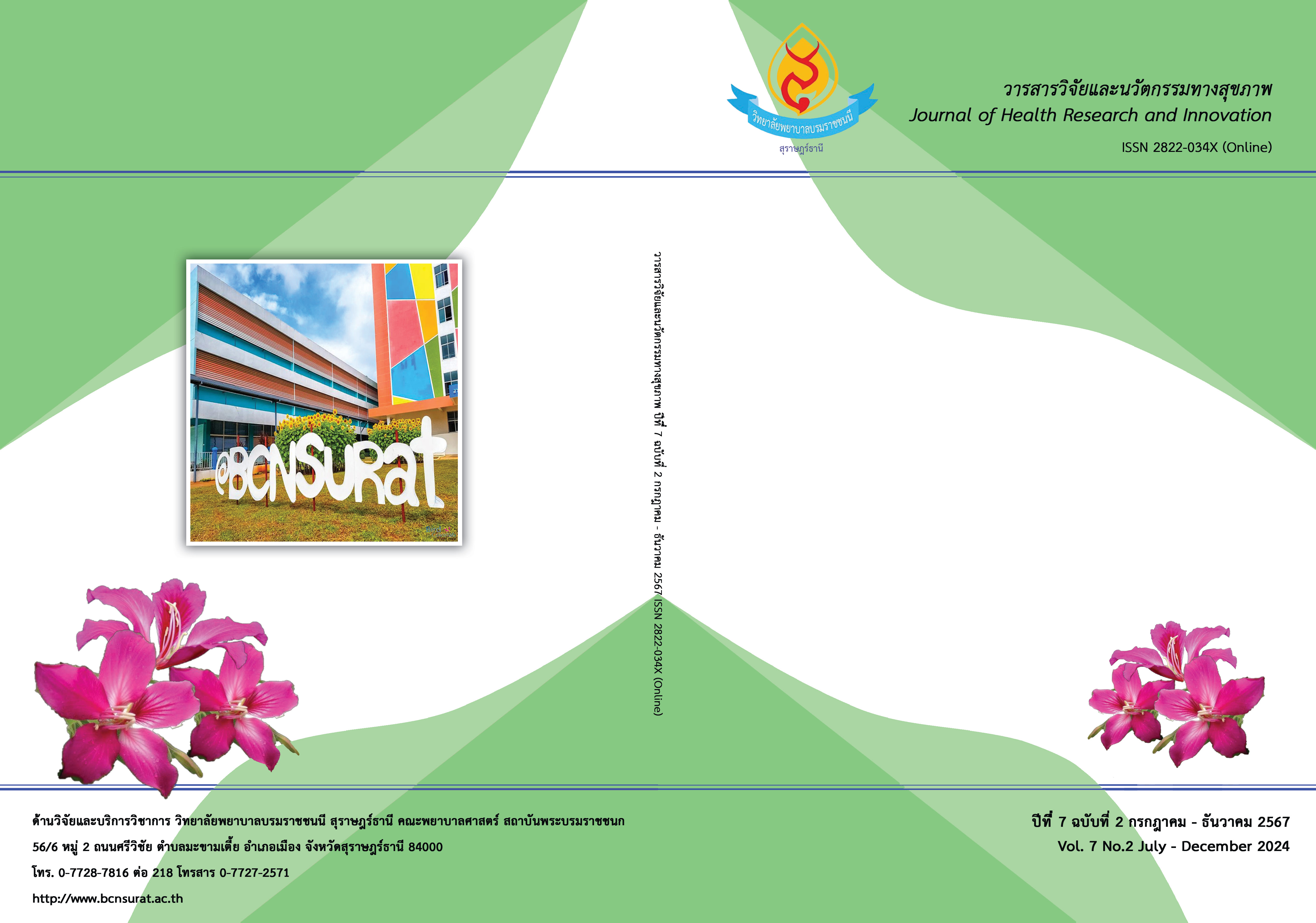ผลของการให้คำปรึกษาแบบสร้างแรงจูงใจต่อพฤติกรรมการสูบบุหรี่ของผู้ป่วยโรคไม่ติดต่อเรื้อรังในคลินิกเลิกบุหรี่ โรงพยาบาลแก่งกระจาน จังหวัดเพชรบุรี
คำสำคัญ:
การให้คำปรึกษาแบบสร้างแรงจูงใจ, การสูบบุหรี่, โรคไม่ติดต่อเรื้อรังบทคัดย่อ
การวิจัยกึ่งทดลองแบบกลุ่มเดียววัดก่อนและหลังการทดลอง มีวัตถุประสงค์เพื่อศึกษาผลของการให้คำปรึกษาแบบสร้างแรงจูงใจต่อพฤติกรรมการเลิกสูบบุหรี่ จำนวนบุหรี่ที่สูบต่อวัน และระดับความรุนแรงการติดนิโคติน กลุ่มตัวอย่างคือ ผู้ป่วยโรคไม่ติดต่อเรื้อรังที่สูบบุหรี่ คลินิกเลิกบุหรี่ เลือกแบบเฉพาะเจาะจง 34 ราย เครื่องมือที่ใช้ในการทดลอง คือ โปรแกรมการให้คำปรึกษาแบบสร้างแรงจูงใจ 4 ครั้ง ในระยะ 1 สัปดาห์ 2 สัปดาห์ 1 เดือน และ 2 เดือน เครื่องมือที่ใช้ในการรวบรวมข้อมูลคือ แบบประเมินพฤติกรรมการเลิกสูบบุหรี่ แบบบันทึกจำนวนบุหรี่ที่สูบต่อวัน และระดับความรุนแรงการติดสารนิโคติน ผ่านการตรวจสอบความตรงเชิงเนื้อหาโดยผู้ทรงคุณวุฒิจำนวน 3 ท่าน วิเคราะห์ข้อมูลโดยใช้สถิติเชิงพรรณนาและทดสอบค่าที
ผลการวิจัยพบว่า หลังได้รับการให้คำปรึกษาแบบสร้างแรงจูงใจกลุ่มตัวอย่างลดการสูบบุหรี่ได้ ร้อยละ 52.94 และเลิกบุหรี่ได้ ร้อยละ 32.35 ตามลำดับ ร้อยละ 97.13 สูบลดลงเฉลี่ย 10 มวน ร้อยละ 79.42 มีระดับความรุนแรงการติดนิโคตินอยู่ในระดับต่ำ เมื่อเปรียบเทียบพฤติกรรมการเลิกสูบบุหรี่ จำนวนบุหรี่ที่สูบต่อวัน และระดับความรุนแรงการติดนิโคติน พบว่าหลังให้คำปรึกษากลุ่มตัวอย่างมีคะแนนเฉลี่ยพฤติกรรมการเลิกสูบบุหรี่เพิ่มขึ้น (t= -8.37, p< .01) จำนวนบุหรี่ที่สูบต่อวัน (t=3.67, p< .01) และระดับความรุนแรงการติดนิโคตินลดลง (t=2.67, p< .05) อย่างมีนัยสำคัญทางสถิติ
ดังนั้นควรขยายบริการการให้คำปรึกษาแบบสร้างแรงจูงใจในการเลิกบุหรี่ในเครือข่ายบริการสุขภาพ ติดตามผู้ป่วยในระยะยาวเพิ่มขึ้นและพัฒนาศักยภาพการให้คำปรึกษาแบบสร้างแรงจูงใจให้บุคลากรทางสุขภาพ
เอกสารอ้างอิง
Aekplakorn, W., (editor). (2014). Report on survey of Thai people's health by examination Body, 5th time. Health Systems Research Institute (HSRI), Nonthaburi. (in Thai)
Caponnetto, P., Maglia, M., Floresta, D., Ledda, C., Vitale, E., Polosa, R., & Rapisarda, V. (2020). A randomized controlled trial to compare group motivational interviewing to very brief advice for the effectiveness of a workplace smoking cessation counseling intervention. Journal of addictive diseases, 38(4), 465-474.
Chen, H. M., Lee, H. L., Yang, F. C., Chiu, Y. W., & Chao, S. Y. (2020). Effectiveness of motivational interviewing in regard to activities of daily living and motivation for rehabilitation among stroke patients. International journal of environmental research and public health, 17(8), 2755.
Deci, E. L., & Ryan, R. M. (1990). Intrinsic motivation and self-determination in human behavior. New York.
Dobber, J., Snaterse, M., Latour, C., Peters, R., Ter Riet, G., Scholte op Reimer, W., ... & van Meijel, B. (2021). Active Ingredients and Mechanisms of Change in Motivational Interviewing for Smoking Cessation in Patients with Coronary Artery Disease: A Mixed Methods Study. Frontiers in Psychology, 12, 599203.
Dunn, J., Yuan, M., Ramírez, F., Garneau, H. C., Brown-Johnson, C., Breland, H., ... & McGovern, M. (2023). Addressing methamphetamine use in primary care: Provider perspectives. Journal of Addiction Medicine, 17(1), 60-66.
Elrefaey, S. R. I. & Ibrahim, F. S. S. (2019). The Effectiveness of a Motivational Interviewing Program on Smoking Cessation among Smoker Patients with Heart Disease. Journal of Nursing and Health Science (IOSR-JNHS), 8(1), 61-74.
Getz, V., Munkhaugen, J., Lie, H. C., & Dammen, T. (2023). Barriers and facilitators for smoking cessation in chronic smokers with atherosclerotic cardiovascular disease enrolled in a randomized intervention trial: A qualitative study. Frontiers in Psychology, 14, 1060701.
Grobe, J. E., Goggin, K., Harris, K. J., Richter, K. P., Resnicow, K., & Catley, D. (2020). Race moderates the effects of motivational interviewing on smoking cessation induction. Patient education and counseling, 103(2), 350-358.
Health Data Center, Ministry of Public Health. (2018). Screening and treatment of tobacco addicts Phetchaburi Province. (in Thai)
Intarasattakul, N. (2017). The Outcomes of Smoking Cessation among Non-communicable disease Patients at Primary Care Unit and Kumpawapi Hospital, Udonthani Hospital Medical Journal, 25(3); 211-220.
Jundai, A & Puwapanich, P.(2018). The effects of motivational counseling for attitude change on knowledge and attitude toward smoking among drug addicts at Paktho hospital, Changwat Ratchaburi. Thai Journal of Nursing, 67(1), 40-45.
Kaeng Krachan Hospital database. (2018). Cigarette Behavior Screening Report. (in Thai)
Klinsophon, T., Janwantanakul, P., & Thaveeratitham, P. (2017). Reliability of the Thai Version of the Fagerstrom Test for Nicotine Dependence (FTND). Journal of the Medical Association of Thailand, 100(10), 1130-1134. (in Thai)
Makmai, W., Prechawong, S., & Treenai, S. (2019). Effect of Promoting Smoking Cessation Program for Parents to Reduce Secondhand Smoke Exposure in Pediatric Patients with Asthma. Nursing Journal, 46(2), 59-69. (in Thai)
Mankih, R. A., & Hussain, A. H. M. (2022). The Role of Motivational Interviewing in Improving Health State of Patients Undergoing Hemodialysis. Pakistan Journal of Medical & Health Sciences, 16(06), 642-642.
Meijel, B. (2021). Active Ingredients and Mechanisms of Change in Motivational Interviewing for Smoking Cessation in Patients with Coronary Artery Disease: A Mixed Methods Study. Frontiers in Psychology, 12, 599203.
Miller, W. R., & Rollnick, S. (2002). Motivational interviewing: Preparing people for change (2nd ed.). The Guilford Press, USA.
Ok, E., & Kutlu, Y. (2021). The effect of motivational interviewing on adherence to treatment and quality of life in chronic hemodialysis patients: a randomized controlled trial. Clinical Nursing Research, 30(3), 322-333.
Pallant, J. (2016). SPSS Survival Manual: A Step By Step Guide to Data Analysis Using SPSS Program (6thed). McGraw-Hill Education: London.
Pinwihok, S., Kanogsunthornrat, N., & Orasa, P. (2018). The Effects of Motivational Interviewing Combined with Hand Reflexology on Quit Smoking Behavior and Nicotine Withdrawal Symptoms in Tobacco Addicted Patients. Kuakarun Nursing Journal, 25(1), 90-105. (in Thai)
Rose, J., Ahmed, I., Keilty, E., Cooper, C., & Selby, P. (2023). Generation and Classification of Motivational-Interviewing-Style Reflections for Smoking Behavior Change Using Few-Shot Learning with Transformers. Authorea Preprints.
Sayed, S. H., El-Sakkar, S. M., Elsaka, S. A., & El-Houfey, A. A. (2023). Effect of cigarette smoking cessation educational intervention based on the trans-theoretical model using motivational interviewing on Egyptian males' smoking knowledge and behavior: A randomized controlled trial. Nursing Practice Today, 10(2), 108-123.
Sumalee, H., Pitayarangsarit, S., Lamanan, P., & Tangcharoensathien, V. (2015). Assessment of Smoking Cessation Services in Public Health Ministry-Affiliated Hospitals. Health Systems Research Journal, 9(3), 241-252. (in Thai)
Thomson, B., Emberson, J., Lacey, B., Lewington, S., Peto, R., Jemal, A., & Islami, F. (2022). Association between smoking, smoking cessation, and mortality by race, ethnicity, and sex among US adults. JAMA Network Open, 5(10), e2231480-e2231480
Vijit-Sunthornkul, G., Kamphan, D., and Charondee, K. (2016). Trend of Risk Factors and Non-Communicable Disease Behaviors, 2005-2015: Results from the Behavioral Risk Factor Surveillance System (BRFSS) survey. Department of Non-Communicable Diseases, Ministry of Public Health, Bangkok. (in Thai)
World Health Organization. (2021). World Health Organization Global Report on trends in prevalence of tobacco use 2000-2025, 4th edition, Switzerland.
World Health Organization. (2023). Noncommunicable diseases. Retrieved November 3, 2023 from https://www.who.int/news-room/fact-sheets/ /noncommunicable disease.
Xu, M., Guo, K., Shang, X., Zhou, L., Fenfen, E., Yang, C., & Yang, K. (2023). Network Meta-analysis of Behavioral Programs for Smoking Quit in Healthy People. American, Journal of Preventive Medicine, 65(2), 327-336.
ดาวน์โหลด
เผยแพร่แล้ว
รูปแบบการอ้างอิง
ฉบับ
ประเภทบทความ
สัญญาอนุญาต
ลิขสิทธิ์ (c) 2024 วิทยาลัยพยาบาลบรมราชชนนี สุราษฎร์ธานี

อนุญาตภายใต้เงื่อนไข Creative Commons Attribution-NonCommercial-NoDerivatives 4.0 International License.
บทความที่ได้รับการตีพิมพ์เป็นลิขสิทธิ์ของวารสารวิทยาลัยพยาบาลบรมราชชนนี สุราษฎร์ธานี
ข้อความที่ปรากฏในบทความแต่ละเรื่องในวารสารวิชาการนี้เป็นความคิดเห็นส่วนตัวของผู้เขียนแต่ละท่านไม่เกี่ยวข้องกับวิทยาลัยพยาบาลบรมราชชนนี สุราษฎร์ธานี และคณาจารย์ท่านอื่นๆในวิทยาลัยฯ แต่อย่างใด ความรับผิดชอบองค์ประกอบทั้งหมดของบทความแต่ละเรื่องเป็นของผู้เขียนแต่ละท่าน หากมีความผิดพลาดใดๆ ผู้เขียนแต่ละท่านจะรับผิดชอบบทความของตนเองแต่ผู้เดียว



